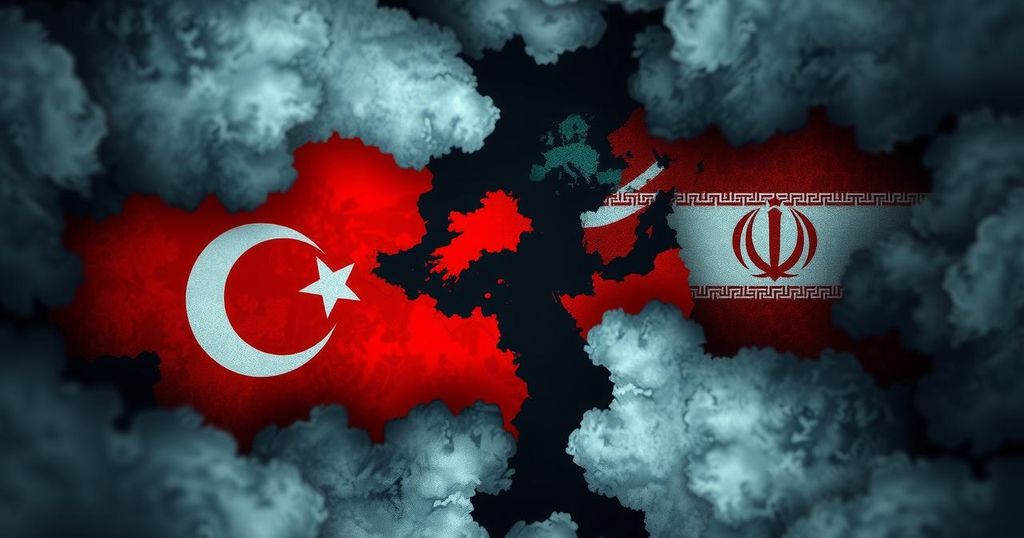Turkey and Iran are facing heightened tensions following shifts in the regional balance of power, particularly after the fall of Bashar al-Assad’s regime. Recent exchanges between Turkish and Iranian officials underscore the complexity of their rivalry, as both nations navigate their ambitions in Syria and Iraq. The dynamic raises concerns of broader regional instability and the potential for proxy conflicts.
The escalating tensions between Turkey and Iran signify a shift from decades of careful management to increasingly open confrontation. The recent collapse of the Assad regime has emboldened Turkey while placing Iran in a defensive position. The dispute over influence in Syria and Iraq has intensified, raising concerns about the wider implications of their rivalry on regional stability.
The recent conflict was triggered when Iranian leaders criticized Turkey’s approach to Syria following PKK leader Abdullah Öcalan’s call for disarmament. In retaliation, Turkey’s Foreign Minister Hakan Fidan cautioned Iran against interfering in neighboring countries’ affairs, implying that such meddling could have adverse consequences. This exchange underscores the fragility of relations between the two countries, particularly as Iran remains wary of Turkey’s potential to encourage separatist movements within its borders.
Historically, Turkey has regarded Iranian regional policies as destabilizing. Despite an initial agreement in 2015 between Turkey and Saudi Arabia to form a united Sunni front against Iran, this collaboration never materialized due to Turkey’s reliance on Iranian energy and diplomatic hesitance left over from the past. However, recent geopolitical changes have led to an altered power dynamic favoring Turkey.
Israel’s military actions have weakened Iran and its proxies, while the fall of the Assad regime solidifies Turkey’s influence in Syria. Coupled with Turkey’s reduced energy dependency on Iran, this sets the stage for Turkey to pursue more assertive foreign policies designed to advance its interests in the region. In Iraq, Turkey aims to strengthen economic and trade partnerships, leveraging American military retractions to its advantage.
In response, Iranian officials have intensified public criticism and proposed strategies to counter Turkish actions. Supreme Leader Ayatollah Ali Khamenei’s advisor conveyed Tehran’s readiness to confront Ankara, warning against Turkish maneuvers perceived as supportive to anti-Iranian elements. Reports from Iranian media assert that Tehran is prepared to disrupt Turkey’s stability should it see fit, particularly targeting the country’s diverse ethnic groups.
Iran’s officials articulate fears regarding Turkey’s historical ambition for regional influence, accusing Ankara of interfering in Iran’s ethnic matters to bolster its soft power in the Middle East. While direct military confrontation appears unlikely, both nations are diligently navigating a rivalry that could emanate into broader areas of influence beyond their immediate borders.
As both nations jockey for enhanced positions in Syria and Iraq, tension remains palpable. Turkey has indicated concerns regarding Iran’s potential to instigate opposition to Turkish objectives in Syria, as well as complications in its negotiations with the PKK regarding peace initiatives. In Iraq, Turkey wishes to establish stronger economic ties, although ongoing Turkish-Iranian tensions pose a significant obstacle to achieving these aims.
Despite the risk of escalating conflict, Iranian officials signal a desire for de-escalation with Turkey, perceiving recent Turkish activities as attempts to deter Iranian support for Kurdish elements. This ambivalence reflects Iran’s need to juggle its strategic responses amid pressures from the United States and its overarching goal of containing Tehran’s influence in the region.
There remains a significant chance that the rivalry may intensify across different fronts, particularly as both nations extend their influence into the South Caucasus, Central Asia, and potentially even conflict-prone areas like the Horn of Africa. Without careful management, this could lead to escalating proxy competition reminiscent of the post-Arab Spring regional dynamics, thwarting hopes for stability and peace that many in the region have sought to achieve.
The intensifying tensions between Turkey and Iran reflect the fragile balance of power in the region, which has been upset by significant geopolitical changes. While both nations pursue divergent interests in Syria and Iraq, the risk of their rivalry spilling over into broader conflicts persists. Effective management of these tensions is crucial to prevent a return to a destabilizing zero-sum game in the Middle East.
Original Source: www.mei.edu




